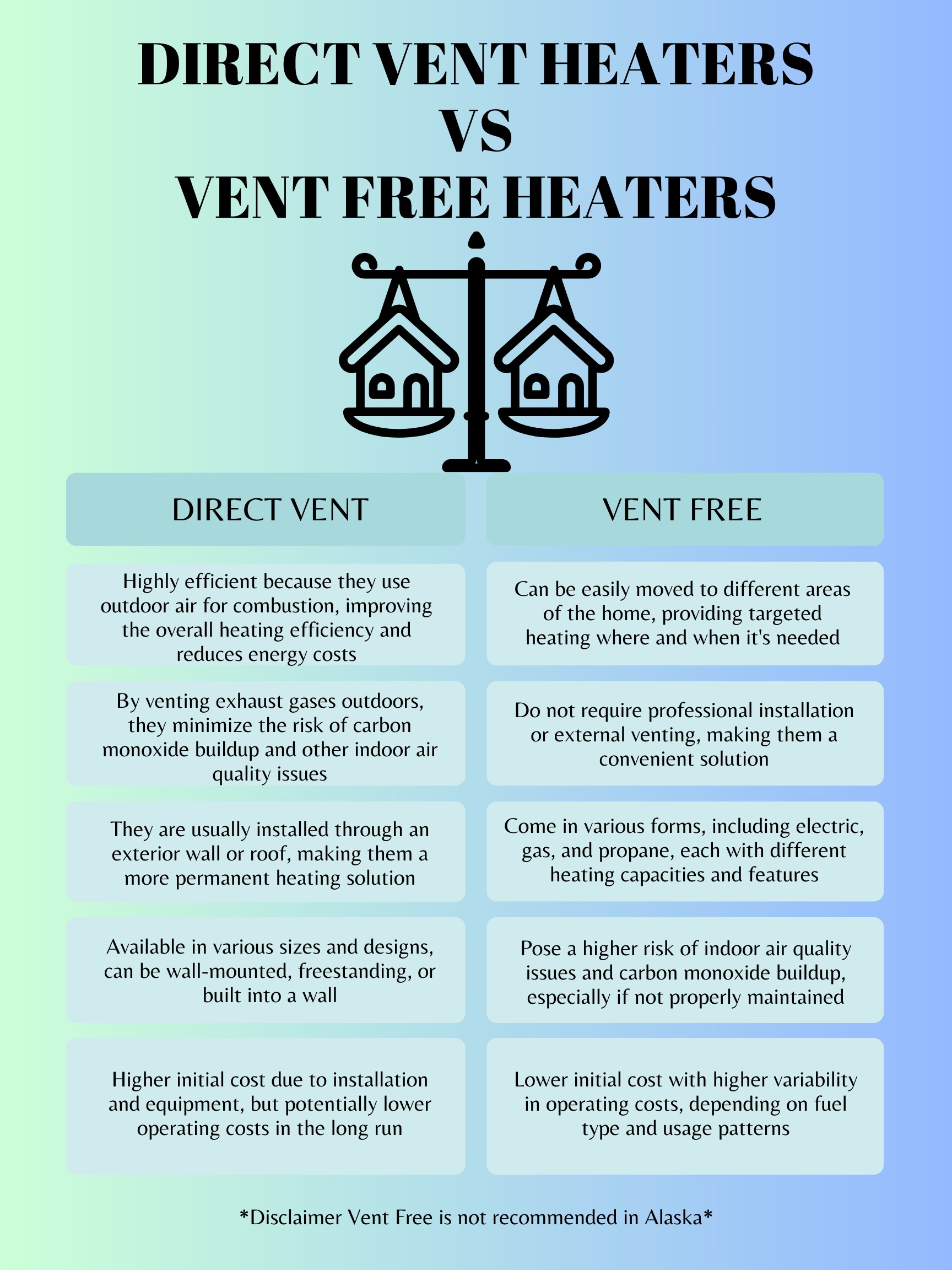Direct Vent vs Vent Free Heaters: A Comprehensive Comparison for Home Heating

When it comes to home heating, choosing the right type of heater can significantly impact your comfort, energy efficiency, and safety. Two popular options are direct vent heaters and vent free heaters. Each type has its unique advantages and disadvantages, making it essential to understand their differences before deciding which one is best suited for your needs.
What Are Direct Vent Heaters?
Direct vent heaters are heating systems designed to draw combustion air from outside the home and expel exhaust gases back outdoors. This sealed combustion process ensures that the indoor air quality remains unaffected by the heating process.
Key Features of Direct Vent Heaters:
Efficiency: Direct vent heaters are highly efficient because they use outdoor air for combustion, which improves overall heating efficiency and reduces energy costs.
Safety: Since these heaters draw air from outside and vent exhaust gases outdoors, they minimize the risk of carbon monoxide buildup and other indoor air quality issues.
Installation: Direct vent heaters usually require professional installation to ensure proper ventilation and safety. They are usually installed through an exterior wall or roof, making them a more permanent heating solution.
Variety: Available in various sizes and designs, direct vent heaters can be wall-mounted, freestanding, or built into a wall, offering flexibility in placement and aesthetic appeal.
What Are Free Space Heaters?
Free space heaters are portable heating devices that can be moved from room to room as needed. They operate by using the air within the room for combustion and releasing heat directly into the space.
Key Features of Vent Free Heaters:
Portability:One of the main advantages of vent free heaters is their portability. They can be easily moved to different areas of the home, providing targeted heating where and when it's needed most.
Installation:Unlike direct vent heaters, vent free heaters do not require professional installation or external venting, making them a convenient and cost-effective option.
Variety:Vent free heaters come in various forms, including electric, gas, and propane models, each with different heating capacities and features.
Cost:Generally, vent free heaters are less expensive upfront compared to direct vent heaters. However, their operating costs can vary depending on the fuel source and usage.
Comparing Direct Vent Heaters and Vent Free Heaters
| Direct Vent Heaters | Vent Free Heaters | |
|---|---|---|
| Efficiency and Energy Costs | More efficient due to the sealed combustion process, which uses outdoor air and minimizes heat loss. This can lead to lower energy bills over time. | Efficiency varies by model and fuel type. Electric models may be less efficient and more expensive to operate than gas or propane options. |
| Safety | Safer in terms of indoor air quality, as they vent combustion gases outside, reducing the risk of carbon monoxide poisoning and indoor pollution. | Pose a higher risk of indoor air quality issues and carbon monoxide buildup, especially if not properly maintained or used in enclosed spaces without adequate ventilation. |
| Installation and Flexibility | Require professional installation, making them a more permanent solution. They offer fewer placement options but integrate seamlessly into the home’s design. | Easy to set up and move, providing flexible heating solutions for different areas of the home. Ideal for temporary or supplemental heating needs. |
| Cost | Higher initial cost due to installation and equipment, but lower operating costs in the long run. | Lower initial cost with higher variability in operating costs, depending on fuel type and usage patterns. |
Which Heater Is Right for You?
The choice between a direct vent heater and a vent free heater depends on your specific heating needs, budget, and preferences. If you prioritize efficiency, safety, and a more permanent heating solution, a direct vent heater may be the better option. However, if you need a flexible, portable, and cost-effective solution for supplemental heating, a vent free heater could be the right choice. Before deciding, consider the size of the space you need to heat, your long-term energy costs, and any installation requirements.
